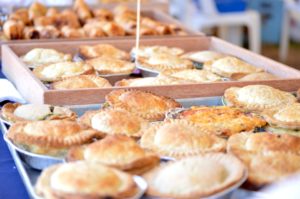Historically Christmas was first celebrated by Christian churches on January 7 until the 16th century. Christmas was changed to December 25 after the Gregorian calendar was adjusted by the Church of Rome. However, the Easter Orthodox church continued to celebrate Christmas on January 7 and some Appalachians continue this tradition.
Christmas in Appalachia historically was a joyful and peaceful time. Harvest was gathered and with full pantries, the Appalachians took this time to relax and enjoy the fruits of all of their labors. Houses across Appalachia were filled with the sounds of children’s laughter and the smell of applesauce cakes, pumpkin and mince pies, popcorn balls and fudge. Families gathered together to celebrate family and community.
How the Railroad Changed Christmas In Appalachia
Coal camps and railroad tracks brought change to many Christmas customs in Appalachia. Railroads and coal camps brought industry to Appalachian families. This brought an end to the tradition of poor Appalachians calling upon prosperous neighbors for help. Coal communities began setting up a community Christmas tree and each child was given a Christmas present! Families would receive fruit, candy, and nuts. Often the cost of these things was later taken out of the miner’s paychecks.
Some Old Christmas Traditions Live On
In some parts of Appalachia older traditions are still honored in a variety of ways including games, shooting matches, Christmas pageants, Christmas caroling and visits.
Many Appalachian traditions can be traced back to the Scottish-Irish pioneers who settled the mountain landscape. In the olden days, young people would celebrate Christmas by loudly participating in activities like setting bonfires and going serenading, which involved shooting guns and firecrackers as well as singing.
Scottish settlers also brought fruitcake to the Appalachian region. It is traditionally made of fruits, nuts, and Scottish whiskey. Fruitcake is still often made and given as a gift throughout Appalachia.
Legends of Appalachian Christmas
Appalachian legends have been passed down from generation to generation. Deep in the Appalachian mountains, many of these legends and superstitions still play a role in the Christmas season.
- In the mountains of Appalachia in the late 1800’s, children began to write letters to Santa and then they would burn the letters in the fireplace so fairies could carry their message up the chimney to Santa Claus.
- Many farmers believe that the weather on Christmas Day forecasts the coming year. If Christmas Day is warm a cold Easter follows. If Christmas is green a white Easter will happen. Lastly, a windy Christmas means a good season for crops.
- Single girls who visit a hog pen at midnight on Christmas Eve will discover the type of man that they will marry. If an old hog grunt first, she will marry an old man. If a young pig grunts first, her husband will be young and handsome
Let’s Look At Some Appalachian Superstitions
Christmas Eve
- Many believe that animals kneel at midnight on Christmas Eve as they did by the manager when Christ was born. They also talk during this time and it is bad luck to hear them speaking.
- If you sit beneath a pine tree on Christmas Day you might hear an angel sing, however, if you do you will not be alive to celebrate another Christmas.
- A rooster crowing on Christmas Eve wards off evil spirits.
Christmas Day
- Any loaves of bread and cakes made on Christmas Day have healing abilities. Many would preserve these baked goods so they could be used to cure illnesses throughout the year.
- Hearing a cat meow on Christmas Day causes evil spirits to visit you throughout the new year.
- Christmas Day visits to neighbors’ houses required the visitors to eat a piece of stack cake or mince pie to ensure good luck. Visits from twelve neighbors ensure good luck for the whole year.
No one does Christmas like we do in Appalachia. Our traditions make us who we are and make our Christmas seasons unique, treasured and unforgettable!





I was born and raised in the mountains and love this page. Please keep me informed.